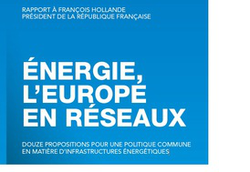March 7, 2015
Bibliographic Reports : Books

It is often argued that energy because it is a matter of sovereignty and because it is rooted in the territory, returns to the State. But it is resolutely towards Europe that Michel Derdevet pulls the whole system.
Probably by conviction, by will of a strong Europe and because there has economic power only when propped on energy. However, an energy system that is up by networks as in energy, we never doubted the convergence between the container and the content, meaning that the energy source is irrelevant whitout being carried, whitout being 'provided to users.
This construction of the networks is political and it is in terms of "mesh" that the report Michel Derdevet just submitted to the President of the Republic, François Hollande, presents a European project. In a way, it is not "revolutionary", as it is to finally fulfill the will of those who conceived Europe in 1945 through the coal, steel and energy, to a common Europe from which built the industry, not only for the reconstruction of Europe but for its economic dynamism and its common security policy.
In this, the European network of the transportation of electricity is essential. Yet it is to be done because the legislation of the European Union rather liberalized energy markets whitout building Europe of energy, leaving remaining national specificities. The result is what Michel Derdevet rightly called "inertia".
He therefore proposes the establishment of an "European industrial project." In this context, Michel Derdevet requires better definition of "model of norms and regulation", aiming in particular the structure of tariffs that include or not the R & D according to the Member States, claiming the alignment of the tasks of network operators and a price guarantee for users, which would facilitate investment. He stressed that national regulatory differences hinder the development of smart grids (and therefore the European market). Without a convergence of regulations, interoperability is not optimal, as it would allow Europe to be a major global player in energy.
Michel Derdevet therefore advocates regulation that goes to both a stronger European articulation, but at the same time which must be more "decentralized", for users to make better use of new uses of energy through the action of regulators they are close.
It is true that we are very far off ...
This is why the author asks what one favors "regulatory convergence". This is not only to harmonize rules but also to redirect them to detach the competitive prism to direct them to the long-term financing.
It is true that Europe's energy, without which a single industrial space can hardly be, can not actually do if the regulation does not resolutely takes over the principle of competition, competition remaining in the moment of exchange, while the Regulation is in the long term and what to take to designate as "industrial policy" which is nothing but a form of expression of the Political.
So what Michel Derdevet request, what ever that finally the arrival of a political Europe, the need for it finds its place in the global competition.
Updated: Sept. 26, 2011 (Initial publication: June 7, 2011)
Releases : I. Isolated Articles

Translated Summaries
ENGLISH :
This article provides an economic perspective on the role played by
competition policy in the development of competition in various
transport sectors. After a brief reminder of some economic features that
are shared by different transport modes, it mainly examines the
principles and practical underpinnings of merger control as it is
implemented in the present context of rapid consolidation in some
transport sectors. Thereby, it stresses some potential shortcomings of
the traditional merger regula tion approach in the particular context of
transportation services, pointing to an excessive attention paid to
potential competition issues on overly narrow relevant markets while
largely ignoring global efficiency-enhancing effects of mergers and
alliances.
ITALIAN
Articolo: Trasporti, concorrenza e politica in material di concorrenza.
Questo articolo delinea una prospettiva economica del ruolo della politica in materia di concorrenza nello sviluppo della libera concorrenza in vari settori dei trasporti. Dopo un breve richiamo ad alcuni aspetti economici, comuni a diversi tipi di trasporto, l’articolo passa in esame i principi e le pratiche fondamentali del controllo delle concentrazione cosi come applicato nell’attuale contesto di consolidamento di alcuni settori dell’industria dei trasporti. Tuttavia, l’articolo mette in rilievo ugualmente alcune carenze potenziali di un approccio classico della regolazione delle concentrazioni nello specifico settore dei trasporti, tra cui l’eccessiva attenzione data alle questioni di concorrenza potenziale su mercati di dimensioni ridotte e la noncuranza generalizzata degli effetti di alleanze e fusioni in materia di efficacia e di progresso.
SPANISH
Artículo: Transporte, competencia y política competitiva
Este artículo da una perspectiva económica sobre el rol jugador por la política de la competencia y el desarrollo de la competencia en varios sectores de transporte. Después de un breve recordatorio sobre las características económicas compartidas por diferentes modales de transporte, examina principalmente los principios y detalles prácticos de la implementación de control de uniones en el contexto presente de consolidación rápida en algunos sectores de transporte. El artículo pone énfasis algunos de los defectos potenciales del la regulación tradicional de uniones, particularmente en el contexto de los servicios de transporte, indicando un enfoque excesivo a cuestiones de competencia potencial en mercados demasiado estrechos y a la vez ignorando los efectos del mejoramiento de eficacia global de las uniones y las alianzas.
PORTUGUESE
Artigo: Transporte, concorrência e política concorrencial
Este artigo fornece uma perspectiva econômica sobre o papel exercido pela política concorrencial no desenvolvimento da concorrência em diversos setores de transporte. Após uma breve retomada de conceitos econômicos compartilhados por modos de transporte diferentes, ele examina principalmente os princípios e os problemas práticos do controle como implementado no contexto presente de rápida consolidação em alguns setores de transporte. Assim, ele sublinha alguns potenciais conflitos no enfoque da regulação tradicional no contexto particular de serviços de transporte, apontando para uma atenção excessiva concedida para problemas de concorrência potencial em muito relevantes mercados enquanto são amplamente ignorados os efeitos na eficiência global.
Transporte aéreo – Avião – Aeroporto – Aliança – Comportamento anti-concorrencial – Falência – Concorrência – Autoridade de concorrência – Política de concorrência – Concentração – Contrato – Subsídios cruzados – Economia de escala – Eficiência – Ganho de eficiência – Barreiras de entrada – Equilíbrio – Comissão Europeia – Custo fixo – França – Londres – Incentivo – Operador incumbente – Infraestrutura – Interconexão – Investimento – Monopólio legal – Liberalização – Rede de longa distância – Estrutura de mercado – Controle – Firma de multiprodução – Rede – Mercado oligopolístico – Concorrência potencial – Preço – Elasticidade de preço – Trilho – Transporte por trilhos – Mercado relevante – Transporte rodoviário – Segmento – Serviço – Tempo – Transporte – Reino Unido – Comunidade urbana – Veículo.*
* Em The Journal of Regulation, estas palavras-chave são fornecidas pelo Editor e não pelo Autor.
.....................
Other translations forthcoming.
Updated: Aug. 31, 2011 (Initial publication: July 6, 2011)
Contributions

